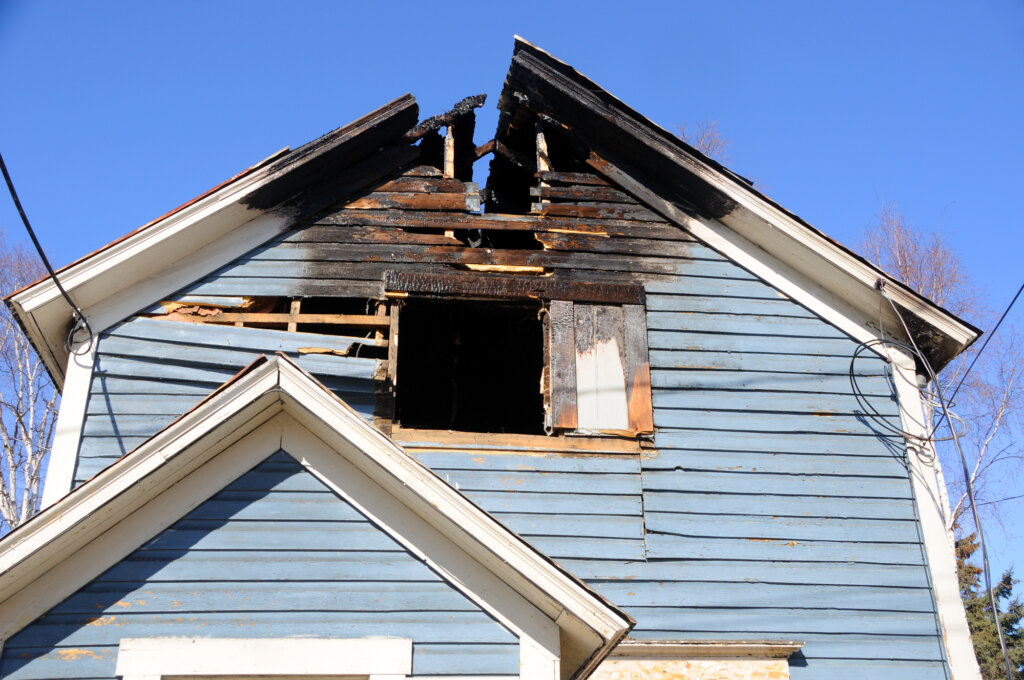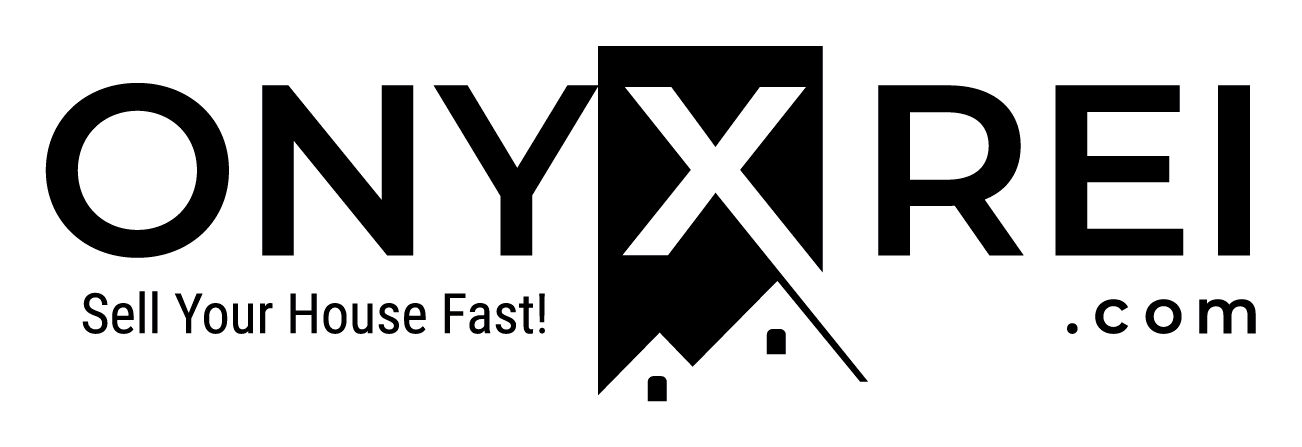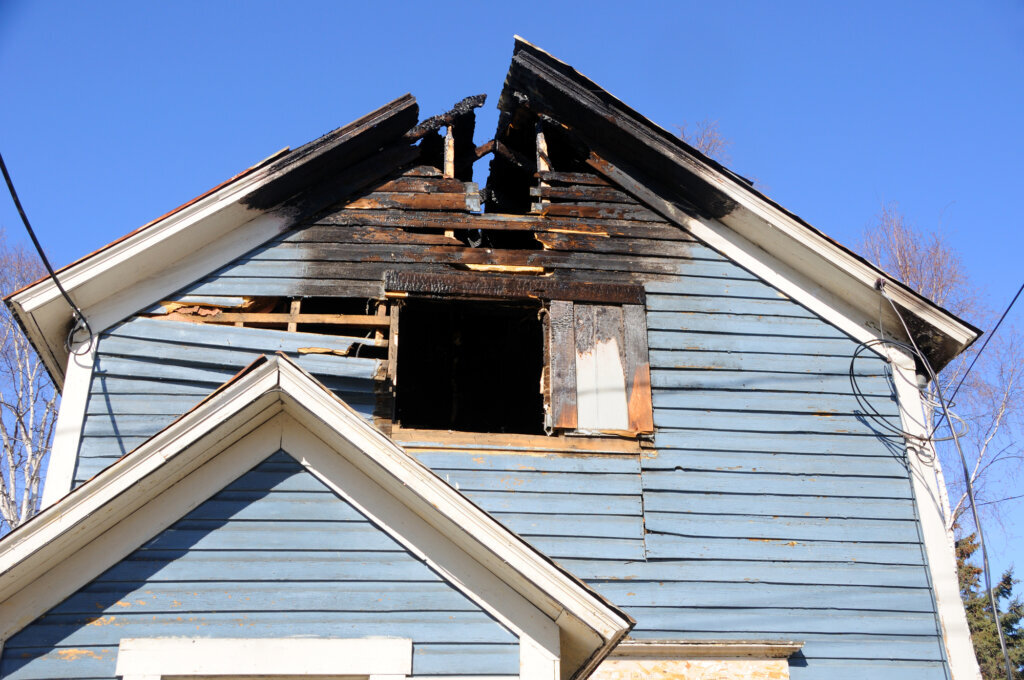
Selling a Fire Damaged House in Virginia
Every 24 seconds, a fire department responds to a fire somewhere in the United States. Although fires have decreased significantly since the 1970’s, the National Fire Protection Association (NFPA) reports that 356,500 home structure fires occurred in 2020, with an estimate of over $8.4 billion in property damage*. If you or someone you love has been a victim of a fire that caused major damage to your property, moving on may be an important next step in your healing process. However, selling a fire damaged house in Virginia may seem like a daunting challenge after such a traumatic event.
How To Sell a Fire Damaged House?
When a house fire causes only minimal damage that is mainly cosmetic, a realtor may advise you to simply cover it up with paint and move on. However, before taking that step, it’s crucial to consider the legal implications. Prospective buyers must be informed about any fire, smoke, or water damage that occurred in the property. They may even request a specialized inspection to verify that the damage has been adequately addressed and the house is ready for occupancy.
For many property owners, selling a fire damaged house in its current condition with a conventional real estate agent may not be viable, especially when the property has suffered extensive damage from a fire. Fire, smoke, and water damage can significantly impact the structural stability of your property, necessitating a careful evaluation of safety considerations before proceeding with any repair work prior to listing the property for sale. If the repair costs prove to be prohibitive given your circumstances, opting for a direct cash home buyer such as Onyx REI could offer a viable solution.
Restore Or Sell As-Is?
When selling a fire damaged house or property in Virginia, homeowners have two options: restoring the property to its previous condition to sell with a local real estate agent or selling their home “as-is” to a cash buyer. While selling your house for the most money possible with an experienced agent may sound like the ideal choice, the reality is that you’ll have to wait months for a contractor with experience in the restoration of fire damaged homes to start on the repairs.
Following the completion of the restoration process, there may be additional waiting time for the city to conduct an inspection for code violations. Any identified violations would require further work by your contractor to ensure compliance before the city grants approval for your property.
With the need for repairs, inspections, and adherence to local licensing and code regulations, the expenses and time investment for a fire-damaged property can escalate significantly without a substantial return on investment upon resale. Even if your insurance policy covers the repair costs, it is possible that alternative housing expenses during the repair period may not be included.
Given the financial burden many homeowners face in such situations, selling your fire-damaged home quickly and effortlessly could emerge as the most practical solution.
Tips For Selling a House with Fire Damage in Virginia
- Explore Your Selling Options
Have you recently experienced a fire and are considering selling a fire damaged house or property in Virginia? Whether you are contemplating selling your property as-is to a direct home buyer to avoid the hassle and stress, or you have the resources to restore your home and sell it through a traditional real estate agent once the repairs are done but are hesitant to wait, explore the pros and cons of your selling options below.
- Clean & Restore The Home
Cleaning and restoring a home after a fire is a complex process that requires careful planning, specialized knowledge, and the right equipment. Here is an overview of the steps involved in cleaning and restoring a home after a fire:
1. Safety First: Before entering the fire-damaged home, ensure that it is safe to do so. Check for structural damage, electrical hazards, and other potential dangers. Wear appropriate personal protective equipment, such as gloves, goggles, and a mask, to protect yourself from soot, debris, and other contaminants.
2. Assessment and Documentation: Conduct a thorough assessment of the damage to the property. Take photos and document the extent of the fire damage for insurance purposes. Identify areas that require immediate attention and prioritize tasks based on the severity of the damage.
3. Ventilation: Proper ventilation is essential to remove smoke odor and improve air quality inside the home. Open windows and doors, use fans, and consider using air purifiers to help circulate fresh air and eliminate lingering smoke particles.
4. Soot and Smoke Removal: Soot and smoke residue can cover surfaces throughout the home, including walls, ceilings, floors, and furniture. Use specialized cleaning products and techniques to remove soot stains and smoke odor from various surfaces. It may be necessary to hire professional restoration companies with experience in fire damage cleanup.
5. Cleaning and Deodorizing: Clean all surfaces in the home, including walls, ceilings, floors, and personal belongings, to remove soot, smoke residue, and odors. Use appropriate cleaning products and techniques for each type of surface. Consider professional cleaning services for items that require specialized treatment.
6. Water Damage Mitigation: If water was used to extinguish the fire, there may be water damage in addition to fire damage. Address water damage promptly to prevent mold growth and further structural damage. Use dehumidifiers and fans to dry out the affected areas.
7. Structural Repairs: Assess the structural integrity of the home and address any damage to walls, ceilings, floors, and other structural components. Work with qualified contractors to repair or replace damaged materials as needed.
8. HVAC System Cleaning: The HVAC system can spread smoke odor and contaminants throughout the home. Clean and inspect the HVAC system thoroughly to remove soot and smoke residue. Consider replacing air filters and scheduling professional duct cleaning.
9. Content Cleaning: Clean and restore personal belongings, furniture, and other items that were affected by the fire. Some items may need to be professionally cleaned, deodorized, or restored off-site.
10. Final Inspection: Once the cleaning and restoration process is complete, conduct a final inspection to ensure that the home is safe, clean, and free of odors. Address any remaining issues before allowing occupants to return to the property.
Cleaning and restoring a home after a fire is a challenging and time-consuming process. It is essential to work with experienced professionals, such as restoration companies, contractors, and cleaning services, to ensure that the job is done thoroughly and effectively. Proper restoration efforts can help salvage the property and restore it to a safe and habitable condition.
- Repairing A Fire Damaged Home
Homeowners in Virginia who complete all necessary repairs and upgrades may inadvertently decrease the appeal of their property to investors. Direct buyers and real estate investors seek properties at a discount to renovate and sell for profit. Investors prefer assurance that repairs were done correctly and up to code. They have access to professional cleaners and contractors specializing in smoke, water, and fire damage, ensuring efficient restoration. Experienced companies like Onyx REI excel in major renovations, completing repairs promptly and to investor specifications for profitable resale.
Fill out the Form For Your No-Obligation, “As-Is” Cash Offer!
"*" indicates required fields
- Disclosing Fire Damage To Potential Buyers
Disclosing that a home has been fire-damaged to potential buyers is essential to building trust, maintaining transparency, and complying with legal requirements. Here are some key points to consider when disclosing fire damage to potential buyers:
1. Legal Obligations:
– Laws regarding disclosure requirements vary by location, but in most jurisdictions, sellers are legally obligated to disclose any known material defects or damage to the property, including fire damage.
– Failure to disclose known fire damage can lead to legal consequences, financial liabilities, and potential lawsuits.
2. Complete Disclosure:
– Provide potential buyers with comprehensive information about the fire damage, including the extent of the damage, repairs that have been made, and any ongoing issues related to the fire.
– Disclose any insurance claims filed, repairs completed, permits obtained, and any documentation related to the fire damage.
3. Written Disclosure:
– Document the details of the fire damage disclosure in writing as part of the seller disclosure statement or in a separate disclosure document.
– Clearly outline the history of the fire damage, repairs undertaken, and any potential implications for the property.
4. Be Transparent:
– Be open and honest about the fire damage when communicating with potential buyers. Answer any questions they may have regarding the extent of the damage, repairs, and potential risks associated with the property.
– Disclose any known issues with the property that may have resulted from the fire damage, such as smoke odor, structural damage, or electrical issues.
5. Professional Inspection Reports:
– Consider providing potential buyers with copies of any inspection reports, assessments, or evaluations related to the fire damage.
– Having professional documentation can help reassure buyers that the property has been thoroughly assessed and repaired to a satisfactory standard.
6. Seller’s Disclosure Form:
– Fill out the seller’s disclosure form accurately and include information about the fire damage in the appropriate sections.
– If there are specific questions related to fire damage on the disclosure form, provide detailed and honest answers when selling a fire damaged house.
7. Work with Real Estate Professionals:
– Consult with a real estate agent or real estate attorney who can provide guidance on disclosure requirements and best practices.
– An experienced real estate professional can help ensure that you comply with legal obligations and effectively communicate the fire damage information to potential buyers.
8. Mitigate Buyer Concerns:
– Acknowledge that selling a fire damaged house may raise concerns for potential buyers and be prepared to address any questions or reservations they may have.
– Provide reassurance about the repairs that have been made, warranties on work completed, and steps taken to restore the property.
By disclosing fire damage to potential buyers in a transparent and truthful manner, you can help build trust, mitigate risks, and ensure a smooth and ethical real estate transaction. It is important to comply with legal requirements and provide accurate information to buyers to make informed decisions about the property.
Selling your fire-damaged home in Virginia for Cash
Selling your fire-damaged home in Virginia to an experienced cash buyer can save you from costly upfront repair expenses. Some real estate investors specialize in purchasing properties with fire damage in Virginia, bringing valuable restoration skills to the table. These experts prioritize quick transactions, allowing you to expedite your moving process. By sidestepping traditional bank loans, cash buyers simplify the purchasing procedure through their available resources.
However, opting for a direct sale to a cash buyer might not fetch the full market value that a traditional sale post-repairs could achieve. The specialized nature of the fire-damaged property market could limit negotiation room, affecting potential future profits. It’s essential to weigh the convenience against potential earnings when selecting your sales strategy.
In the end, the decision between a swift sale to professionals like Onyx REI or investing in repairs for a higher future return lies in your hands. Assess your priorities concerning time, finances, and effort before making a well-considered choice.
Can You Sell a House with Fire Damage As-Is?
Yes, it is possible to sell a house with fire damage “as is,” meaning that the property is sold in its current condition without the seller making any repairs or renovations. Selling a fire-damaged house as is may be a viable option for sellers who do not want to invest the time and money into restoring the property before putting it on the market. Here are some key points to consider when selling a house with fire damage as is:
1. Disclosure: It is crucial to disclose the fire damage to potential buyers upfront. Transparency is key to building trust and avoiding legal issues. Be honest about the extent of the damage, any repairs that have been made, and any issues that may still need to be addressed.
2. Price Consideration: When selling a fire-damaged house as is, the asking price will typically reflect the property’s current condition. Buyers may expect a lower price due to the needed repairs and renovations. It is important to price the property competitively to attract potential buyers.
3. Target Audience: Selling a fire-damaged house as is may appeal to investors, flippers, or buyers looking for a renovation project. These buyers may be willing to take on the challenge of restoring the property in exchange for a lower purchase price.
4. Limited Financing Options: Buyers using traditional financing methods, such as a mortgage, may encounter challenges when purchasing a fire-damaged house as is. Lenders may require repairs to be completed before approving a loan. Cash buyers or investors are often more flexible in these situations.
5. Sell to Investors: Real estate investors who specialize in buying distressed properties may be interested in purchasing a fire-damaged house as is. These investors are accustomed to dealing with properties in need of significant repairs and may be willing to make a cash offer for the property.
6. Legal Considerations: Ensure that you comply with all legal requirements when selling a fire-damaged house as is. Disclose all known issues with the property, provide documentation of the damage, and be transparent with potential buyers to avoid any legal repercussions.
7. Consult with Professionals: Consider working with a real estate agent or real estate attorney who has experience with selling properties in distressed conditions. They can provide guidance on the process, help you navigate legal requirements, and connect you with potential buyers.
Selling a fire damaged house as is can be a viable option for some sellers, especially if they prefer a quick sale without the need for repairs. However, it is important to carefully consider the implications, disclose the damage openly, and work with professionals to ensure a smooth and compliant transaction.
The Quickest Way to Sell a House After a Fire
Selling Your House to A Cash Home Buyer
Tired of the daunting task of restoring a fire-damaged property? Looking to avoid the stress of overseeing contractors constantly while you focus on rebuilding your life? If so, selling your house to a reputable direct home buyer might be the right choice for you. While you may not receive full retail value for your property in Virginia, you can sidestep the need for any repairs.
Working with a Real Estate Agent
Maximizing the sale price of your Virginia residence in today’s market is achievable with strategic investments in repairs and upgrades. Patience is key if opting for renovations to align with regulations. Ensure the expenses incurred for enhancements can be recouped upon selling. It’s important to budget for your agent’s fees, closing expenses, inspections, and any modifications demanded by potential buyers prior to the closing.
Selling a Fire Damaged House For Sale By Owner
Looking to save on commissions and sell your house yourself in Virginia? Be aware that there are strict rules regarding fire disclosure for selling a house or rental property. It is crucial to meet these legal requirements to protect yourself and your finances. Make sure all paperwork is completed accurately before closing to avoid any liabilities.
Sell Your Fire Damaged House Today!
After experiencing a home fire, it is crucial to promptly assess the property’s damage. This evaluation should include structural issues resulting from fire, smoke, and water. When initiating an insurance claim, an insurance adjuster will be dispatched to inspect the property. The adjuster will determine the scope of the damage and coverage provided by the insurance policy.
At this stage, homeowners in the Virginia area dealing with such distressing situations may be surprised to find out that their insurance coverage is insufficient for fully repairing their home. Those with inadequate policies may struggle to afford professional restoration services. In such cases, selling the fire-damaged property directly to a cash home buyer or real estate investor like Onyx REI could be the most viable solution.
Selling a fire damaged house? Reach out to a reputable professional – Onyx REI | 757-260-9572

